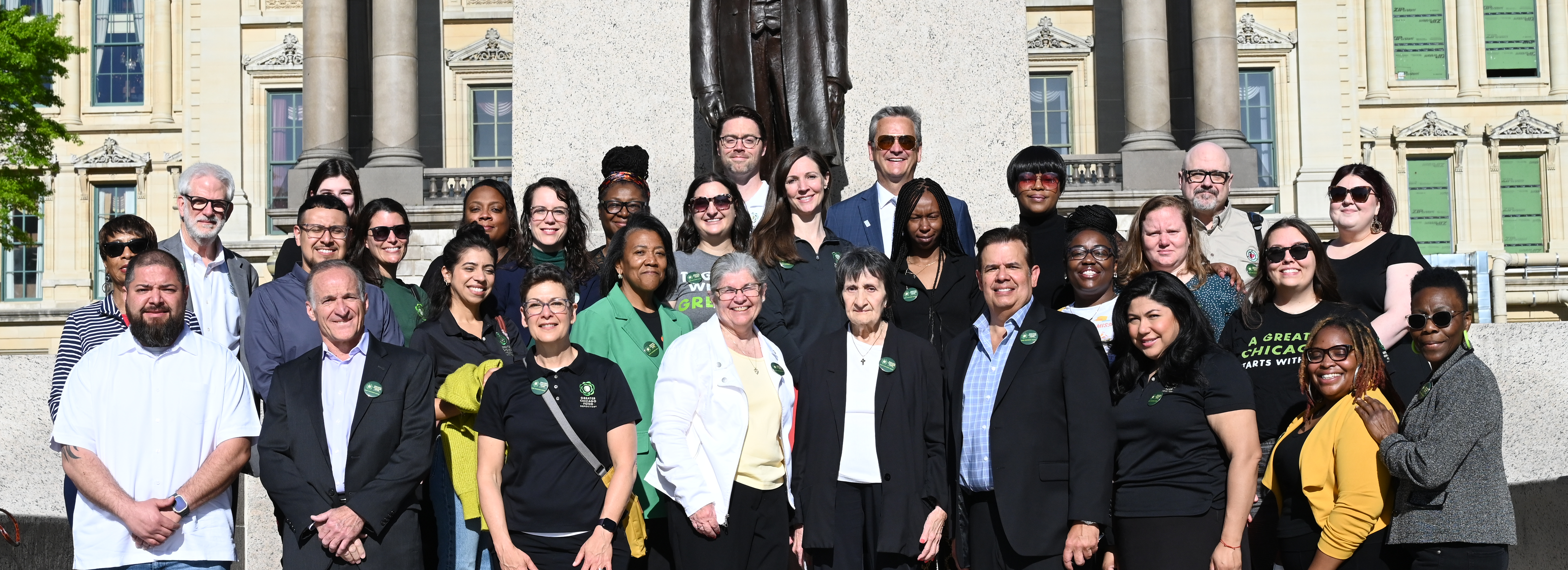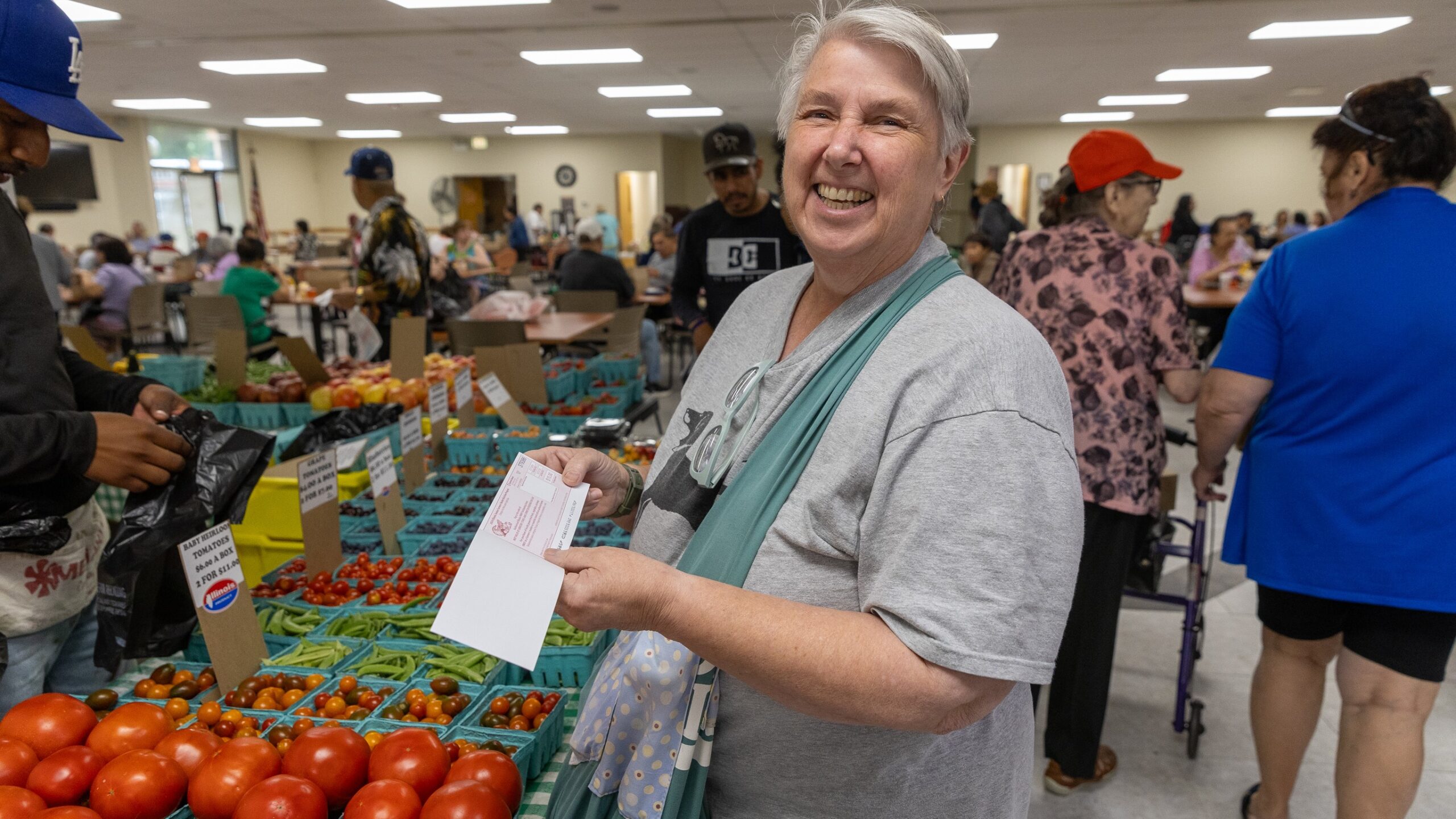
The Power of Raising Our Voices
While the Food Depository is well known for distributing food through a network of food pantries, soup kitchens and meal programs across Chicago and Cook County, our policy and advocacy work is equally important to ending hunger and its root causes.
Data shows that safety net programs are crucial to reducing poverty and food insecurity. During the pandemic, expansions to the Child Tax Credit and nutrition programs like the Supplemental Nutrition Assistance Program (SNAP) and school meals led to the largest one-year drop in child poverty on record, reducing child poverty to an all-time low of 5.2 percent.
Unfortunately, temporary COVID-era expansions expired in spring 2023, and poverty and food insecurity increased throughout FY2024 as families lost expanded benefits at the same time they were faced with high inflation. The Food Depository is committed to advocating for a robust safety net by putting community and partner voices in the forefront and building a movement to end hunger.
"Coming here and talking to the legislators is important because we can make them aware of what’s happening within the communities we serve."
Laverne Horgan, coordinator of Church of the Holy Spirit Food Pantry and participant in the Springfi
One of our biggest advocacy projects in FY2024 was helping to spread the word about Summer EBT, a new federal program that provides qualifying families with school-aged children an EBT (electronic benefit transfer) card to purchase groceries during the months when school is out. In families that struggle to afford food, many children endure a summer nutrition deficit, which can have a devastating impact on young, growing bodies. In the summer of 2024, families enrolled in Summer EBT received a onetime benefit of $120 for each eligible child.
As co-chair of the Illinois Commission to End Hunger, the Food Depository worked closely with the Illinois Department of Human Services, the Illinois State Board of Education and community-based organizations statewide to raise awareness about Summer EBT. We distributed educational materials on the program to hundreds of organizations, libraries and parks and engaged the offices of local, state and federal elected officials.
With more than 1.2 million Illinois children eligible for Summer EBT, the program is expected to generate more than $250 million in economic activity in Illinois – a win for families and local businesses alike.
The Food Depository also mobilized advocates in the spring of 2024 to sound the alarm that the Special Supplemental Nutrition Program for Women, Infants and Children (WIC) was at risk of a funding shortfall. Nearly 50,000 Illinois women and young children faced losing their monthly nutrition benefits. Thanks in large part to a groundswell of advocacy both locally and nationwide, Congress provided the funding necessary to continue serving all eligible women, infants and young children who need assistance.
The Food Depository’s policy work also had a state focus this year. In May, more than 30 Food Depository partners, staff, board members and alumni of our Food Equity Ambassador and Community Council for Food Equity advocacy training programs traveled to Springfield, Illinois, to lobby for two critical anti-hunger bills.
We advocated to fund the Illinois Farm to Food Bank program, a new program that supports families, farmers and food producers alike by purchasing Illinois-grown and -raised products for food banks and pantries to distribute to communities in need. The program provides an economic boost to local farmers while also improving access to fresh produce for neighbors experiencing food insecurity. In FY2023, our Lobby Day participants advocated passionately for the Farm to Food Bank bill – which passed unanimously in both chambers of the General Assembly shortly thereafter. This year our group successfully advocated for the program to be properly funded in the Illinois FY2025 budget.
The group also advocated for funding to create a grant program to help schools implement or expand Breakfast After the Bell programs, which are a proven model to boost school breakfast participation. This investment is especially important given that Illinois ranks 35th among all states in school breakfast participation and there is a clear link between breakfast and health and academic outcomes. Our advocacy made a difference, and the Breakfast After the Bell school grant program was funded at our requested $300,000.
The lobby trips were successful from a policy perspective and meaningful for the participants. “Coming here and talking to the legislators is important because we can make them aware of what’s happening within the communities we serve,” said Laverne Horgan, coordinator of Church of the Holy Spirit Food Pantry, while with the group in Springfield.
Shortly after that trip, a group of advocates representing several of our partner organizations accompanied Food Depository staff members at an anti-hunger Lobby Day in Washington, D.C. to urge lawmakers to support a strong Farm Bill, an extremely consequential piece of legislation to address hunger in America. We urged our legislators to protect, expand, and strengthen SNAP and The Emergency Food Assistance Program (TEFAP), which provides critical food to the emergency food system nation-wide.
As the fiscal year draws to a close, this important work continues as our advocates as well as anti-hunger advocates across the country seek to secure the funding and support necessary to meet the increased need.




